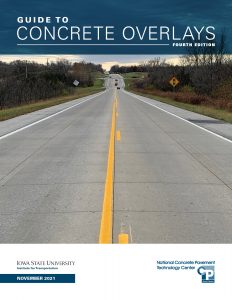InTrans / Nov 12, 2021
CP Tech Center publishes update to Guide to Concrete Overlays

Unbonded concrete overlay with geotextile interlayer on Missouri Route D (Todd LaTorella, ACPA, MO/KS Chapter, used with permission)
Concrete overlays have matured into a standard rehabilitation option for public agencies during the past four decades as they’ve been shown to be an economical, long-lasting solution to extend the life of an existing pavement.
In addition, concrete overlays can contribute meaningfully to an agency’s overall asset management program and have the potential to provide service lives of 30 to 40 years.
Since 2007, the National Concrete Pavement Technology Center (CP Tech Center) has published the Guide to Concrete Overlays to present to pavement engineers the basic principles needed to design and construct concrete overlays on existing asphalt, composite, and concrete pavements. The CP Tech Center recently released the fourth edition of this guide, available here.
The Guide to Concrete Overlays (Fourth Edition) provides updates that include current information on continuously reinforced concrete pavement (CRCP) overlays, geotextile separation layers, fiber reinforcement, design procedures, and lessons learned from the experiences of numerous state highway agency engineers.
“The intent of this guide is to increase the technical proficiency of experienced engineers in the use of concrete overlays, provide less experienced users with the essential knowledge to address the needs of various types of concrete overlay projects, and help all users recognize the versatility of concrete overlays, whether on low-volume roads, city streets, primary roadways, or Interstate highways,” said Gary Fick, of The Transtec Group Inc., a contributing author to the guide.
The other authors are Jerod Gross, PE, LEED AP, Snyder & Associates, Inc.; Mark B. Snyder, PhD, PE, Pavement Engineering and Research Consultants, LLC; Dale Harrington, PE, Harrington Civil Engineering Services; Jeffery Roesler, PhD, PE, University of Illinois at Urbana-Champaign; and Tom Cackler, PE, Woodland Consulting, Inc. The guide was published with funding from and as part of the Federal Highway Administration cooperative agreement Advancing Concrete Pavement Technology Solutions.
“Rather than as a step-by-step manual or series of prescriptive formulae, the material in this guide is presented in the form of expert guidance meant to supplement the professional experience of the reader,” said Gross.
The guide provides users with important considerations in designing and constructing concrete overlays, starting with high-level scoping questions, such as the type and condition of the existing pavement, through detailed engineering considerations, such as treatment of the jointing system.
In addition to this guide, the CP Tech Center has developed a set of resource materials—including webinars, tech briefs, and manuals and guides—to train and educate users on the applications and benefits of concrete overlay technology. These and other concrete overlay resources developed by the CP Tech Center and its partners are available for free download at https://cptechcenter.org/concrete-overlays/.
